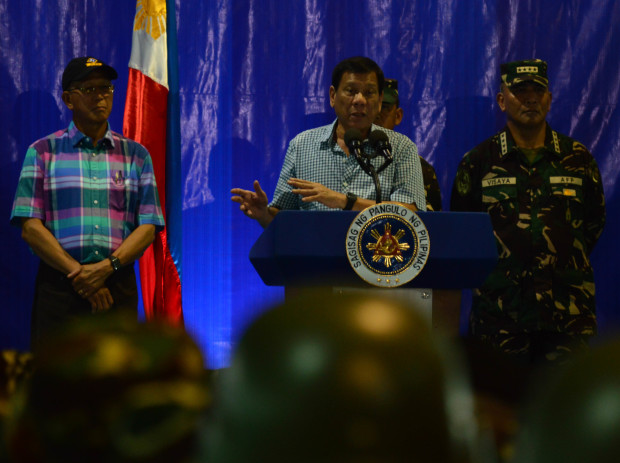Duterte defies Supreme Court
PRESIDENT Duterte on Tuesday sharply rebuked Chief Justice Maria Lourdes Sereno for cautioning judges not to heed his orders to report to police to explain their alleged involvement in illegal drugs and raised the possibility of declaring martial law in the event of a constitutional crisis between the two coequal branches of government.
Sereno had warned in a letter to Duterte on Monday that “it would matter greatly to our sense of constitutional order” if the Supreme Court would be given the chance to discipline members of the judiciary as mandated by law.
“I’m giving you a warning. Don’t create a crisis because I will order everybody in the executive department not to honor you,” Mr. Duterte told Sereno, in his remarks before the military in Cagayan de Oro City.
“Please do not, you say, create a constitutional issue. There will be. Don’t order me, I’m telling you. I hope you are listening,” he said.
“You want me to be frank? You’re interfering (with my job)… Please, don’t order me. I’m not a fool. If this continues, (that) you’re trying to stop me, I might lose my cool. Or would you rather I declare martial law?”
Article continues after this advertisementMr. Duterte scoffed at the Chief Justice’s order to the judges mentioned in the President’s “narcolist” not to yield to authorities until a warrant was issued against them.
Article continues after this advertisementHinting that he would rather circumvent the tedious judicial process than allow drug suspects to go scot-free, he said Sereno “must be joking” when she said that arrest warrants should first be issued against the judges.
On Monday night, Mr. Duterte said he would write Sereno to explain why he had to include the names of seven judges in the list of suspected drug lords or their coddlers.
Not ‘accusatorial’
“Out of respect to the Supreme Court, I will answer,” Mr. Duterte said in a press conference.
The President said he would tell Sereno that his remarks shortly after midnight on Sunday when he read the names on the list were not “accusatorial.”
“It is not a criminal information. It’s just my word against the others because I have a duty to tell the public,” Mr. Duterte said.
The President said his intention in naming the judges, public officials and police officers allegedly involved in illegal drugs, was for people to know who were behind the problem. It will take years before each one of them is convicted, he said.
“How am I now supposed to meet the challenges of this country? Should I arrest each suspect?” Mr. Duterte asked, referring to thousands of drug users and pushers who have surrendered since he assumed the presidency.
The President said he would explain to Sereno how the names of the judges were included on the list.
“Ma’am, the names would not come up because of political harassment. As early as five years ago, the names were already there,” Mr. Duterte said, adding that the dead were included because the intelligence community did not get an update.
“Death is a private affair of a family. It is not announced to the world except for the obituaries. It’s found in newspapers, or somebody would purposely inform government that this idiot is already dead,” Mr. Duterte said.
The President said having been a government prosecutor before becoming mayor of Davao City, he knew how the justice system worked.
At the prosecutor’s level, nine out of 10 cases are dismissed, the President said.
“If it reaches the court, and a judge can be bought, so (the accused is) acquitted,” he said.

Pres. Rodrigo Duterte has remained defiant amid the pronouncement of Chief Justice Maria Lourdes Sereno regarding the inclusion of several judges in his list of persons of interest allegedly involved in illegal drug trade in the country, during his visit to the Philippine Army’s 4th Infantry Division headquarters at Camp Evangelista, Barangay Patag, this city, Tuesday afternoon. (Jigger J. Jerusalem)
Freedom of info
The President said his exposé was in line with the executive order on the freedom of information that he recently signed.
Mr. Duterte said the media had asked for the list. “You asked for information, and I gave it to you,” he said. “That is freedom of information.”
But the President admitted that the information was based on “raw intelligence.”
“But in view of the problem, the seriousness and gravity of the problem, I have to tell you people, and nobody can stop me, do not tell me what to do, how to run this country,” he said.
Palace spokesperson Ernesto Abella sought to downplay insinuations that the President was interfering in judicial functions.
“This is not a judicial process,” the Palace official said. “It’s simply calling attention. It is, in a sense, (the President) taking the moral responsibility to be able to warn the people.”
Added Abella: “He is taking the position of parens patriae. As parent of the nation, he is calling attention to clear and present danger of (illegal) drugs. It’s his moral obligation to make sure the public is properly warned of the drug menace … We are facing an extraordinary danger. In other words, these are not normal times. These are abnormal times that call for radical action.” With a report from Marlon Ramos in Manila
RELATED VIDEOS